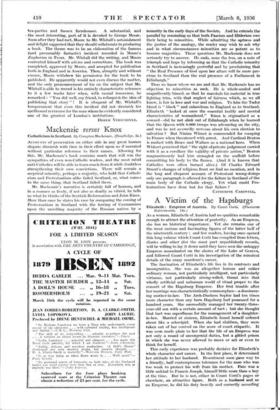Mackenzie versus Knox Catholicism in Scotland. By Compton Mackenzie. (Routledge.
513.) ACCOUNTS of persecution on either side in any great human dispute diminish with time in their effect upon us if narrated without particular reference to their causes. Allowing for this, Mr. Mackenzie's book contains much that will win the
• sympathies of even non-Catholic readers, and the most rabid anti-Catholics will be able to learn much from it while doubtless strengthening their own convictions. There will remain a sceptical minority, perhaps a majority, who hold that Catholi- cism and Protestantism alike failed Scotland, or, what comes to the same thing, that Scotland failed them.
Mr. Mackenzie's narrative is certainly full of horrors, and in a manner as lively, if not also as deadly as vitriol, he tells us what he thinks of the Scottish Reformation and John Knox. More than once he states his case by comparing the coming of Protestantism in Scotland with the forcing of Communism upon the unwilling majority of the Russian nation by a minority in the early-days of the Soviets. And he extends, the ' parallel by reminding us that both Fascism and-Hitlerism owe their being to minorities. While admitting the aptness and the justice of the analogy, the reader may wish to ask why and in -what circumstances- minorities are so potent as to become majorities. These questions Mr. Mackenzie does not seriously try to answer. He ends, none the less, on a note of triumph and hope by informing us that the Catholic minority in Scotland is increasingly powerful and by proclaiming that " the Real Presence of God upon her altars will be more pre- cious to Scotland than the real presence of a Parliament in Edinburgh."
Thus we know where we are and that Mr. Mackenzie has no objection to minorities as such. He is whole-soiled and magnificently biased, so that he marshals his material in true fighting trim, with that neglect of fairness which, as we all know, is fair in love and war and religion. To him the Tudor blood is " black " and calamitous to England as to Scotland. Elizabeth " lacked at once the essential bodily and mental characteristics of womanhood." Knox is ' stigmatised as a coward—did he not slink out of Edinburgh when he learned that the Queen with 8,000 troops was advancing on the city, and was he not avowedly nervous about his own election to salvation ? But Ninian Winzet is commended for escaping to France when threatened with arrest. - And Cardinal Beaton is ranked with Bruce and Wallace as a national hero. When Wishart perceived that "the right of private judgement carried with it as a corollary the validity-of private action," Beaton magnanimously had him strangled on the scaffold before committing his body to the flames: (And it is known that Catholics were often burned alive.) Of Charles Edward Stuart's changes of religious front we find no mention, and in the long and eloquent account of Protestant wrong-doings only one paragraph is allowed for the failure in Scotland-of the main body of the Catholic clergy. Yet what could Pro- testantism have done but for that failure ?
CATHERINE CARSWELL.
















































 Previous page
Previous page